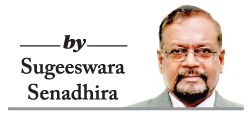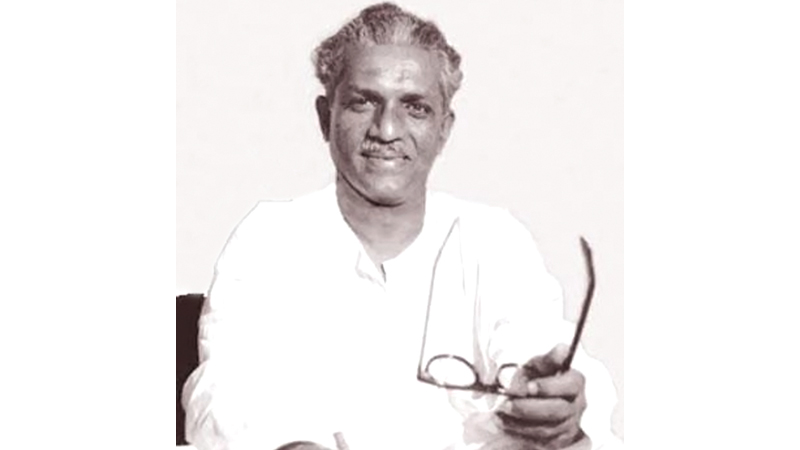 The longstanding vision of Philip Gunawardena who blended Marxist theories of equal distribution of resources with indigenous ethos to fulfill the aspirations of the working class comprising farmers and labourers is equally relevant for today’s leaders of the Left Movement, who have been given an overwhelming mandate by the people.
The longstanding vision of Philip Gunawardena who blended Marxist theories of equal distribution of resources with indigenous ethos to fulfill the aspirations of the working class comprising farmers and labourers is equally relevant for today’s leaders of the Left Movement, who have been given an overwhelming mandate by the people.
Philip, who earned the sobriquet, the ‘Lion of Boralugoda’, was a man of vision who realised that national development should be in harmony with our much cherished spiritual and cultural values.
The members of today’s radical Left Movements could learn valuable lessons from the legacy left by Philip, who had the genuine desire to serve the downtrodden people using whatever means available. Philip was a pragmatic leader who instinctively understood the hopes and aspirations of the people, a man close to the heartbeat of the nation.
His courage was legendary. He was known as the ‘Father of Marxism in Ceylon’ in his radical days when he launched the Lanka Sama Samaja Party (LSSP) together with Dr. N. M. Perera, Colvin R. de Silva and other pioneers of the Left Movement. He soon realised the need to transform the foreign doctrine to meet Sri Lankans’ aspirations. Hence, he launched the new vision of ‘National Socialism’ loosely translated as ‘Jathika Samajavadaya’.
At his death, it was Dr. N. M. Perera, one time his close ally and later a bitter foe in politics that paid the greatest tribute to Philip. He expressed thus on Philip. “History will no doubt accord him his rightful place in the political life of this country. In the years to come, when lesser mortals like us have played their evanescent part and vanished into the limbo of forgotten, a grateful socialist Ceylon will remember him with pride and place him in the worthy pedestal due to him.”
Moral rectitude
Philip Gunawardena was a man of stern moral rectitude. The District Judge who dismissed a defamation case filed by a senior DIG against him declared that Philip was an embodiment of honesty and integrity.
Former High Court Judge and Vice-President of the Newman Society Alumni Association T. A. Leslie Fernando described Philip as a ‘dynamo of activity and he was the directing force of the LSSP. People were attracted by his fire-brand speeches that mesmerised the audience. They were taken up by his charismatic personality and his sincerity of purpose’.
At the 1936 State Council elections, Philip comfortably won the Avissawella Seat and Dr. N. M. won Ruwanwella. The political duo Philip and N. M. vociferously championed the cause of the underprivileged in the State Council. They voiced the sentiments of the masses against oppression of rulers, drawbacks of the Ministers and injustices of various officials and unmasked them. N. M. took the lead from Philip whom he admired to the point of hero worship. (Charles Wesley Ervin – ‘Philip Gunawardena the making of a Revolutionary, 2001 – page 24).
The reactionary elements got alarmed when the LSSP rapidly gained ground in the country, and tried to suppress it. They sent thugs to disrupt the LSSP meetings. But Philip and Robert used both brains and brawn and with the assistance of Harbour workers made those hirelings run for their lives. Strangely enough, in many instances, Philip was taken to Courts as an accused, but he was honourably acquitted in all the cases.
As a youth, he followed a radical revolutionary path that made him work in close collaboration with socialist leaders of many other countries, including the United Kingdom, the United States, Spain and India. In New York, he joined the radical group headed by José Vasconcelos Calderón, called the “Cultural Caudillo” of the Mexican Revolution. Calderón was an important Mexican writer, philosopher, and politician. He was one of the most influential and controversial personalities in the development of modern Mexico.
Close contacts
After returning to Sri Lanka to launch the LSSP, the party’s famous Suriyamal Campaign and social activities during the Malaria epidemic, he continued to maintain close contacts with the Indian socialist leaders. This became useful when he crossed over to India with colleagues NM, Colvin and others after breaking out of Batticaloa Jail where he was imprisoned by the colonial rulers. He took part in the Indian freedom struggle campaigns while hiding in India until the colonial police captured him and his wife Kusuma and imprisoned them in Bombay Jail.
As a Trotskyite, Philip focused his vision of Trotskyism blending it with nationalism, rather than totally devoting his vision to Marxist theories. The new-found ‘Social Nationalism’ could easily blend with S. W. R. D. Bandaranaike’s middle path and the new pancha maha balawegaya consisting of bhikkhus, indigenous physicians, teachers, peasants and workers. This brought the newly formed Mahajana Eksath Peramuna (MEP) coalition to power in 1956.
Today, radical socialist parties are faced with an identity crisis. They are highly perturbed by the non-acceptance of their policies by the vast majority of the people, though they are popular with the youth of society. They can learn a lesson from left-wing nationalism or leftist nationalism adopted by Philip. During the colonial era, he used it as a policy of anti-imperialism and the national liberation movement. In independent Sri Lanka, his policy was based upon national self-determination, popular sovereignty, national self-interest, and principles such as social equality.
The relevance of Philip’s vision can be discerned in a segment of his speech in Parliament. “The growing divorce between words and their meaning is a major tragedy of our times. Socialism, Democracy, Peace, Freedom are used in a manner that makes them not only meaningless but topsy-turvy. The fluidity in the meaning of words creates crisis in communication. Words instead of clarifying and crystallising thoughts confuse them. Today, counterfeiters have seized the temple of Saraswathi. As false coins bring about the breakdown of an economy and society, so counterfeiters in language destroy popular confidence. Dull indifference is the only response when not the goblet alone but the grapes are without wine.”




